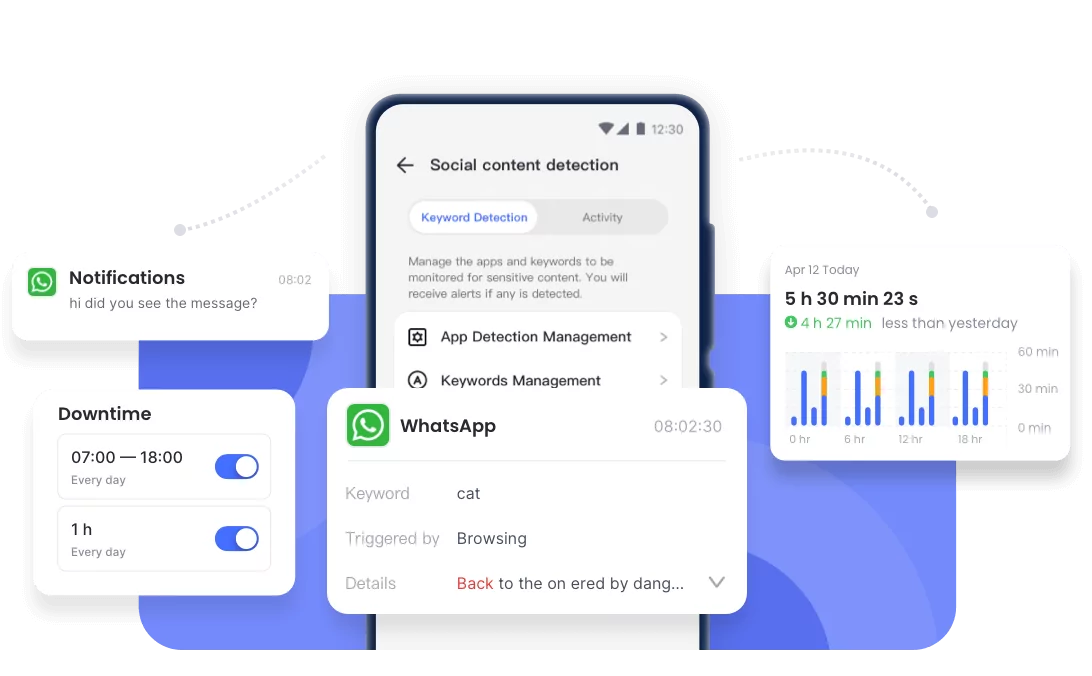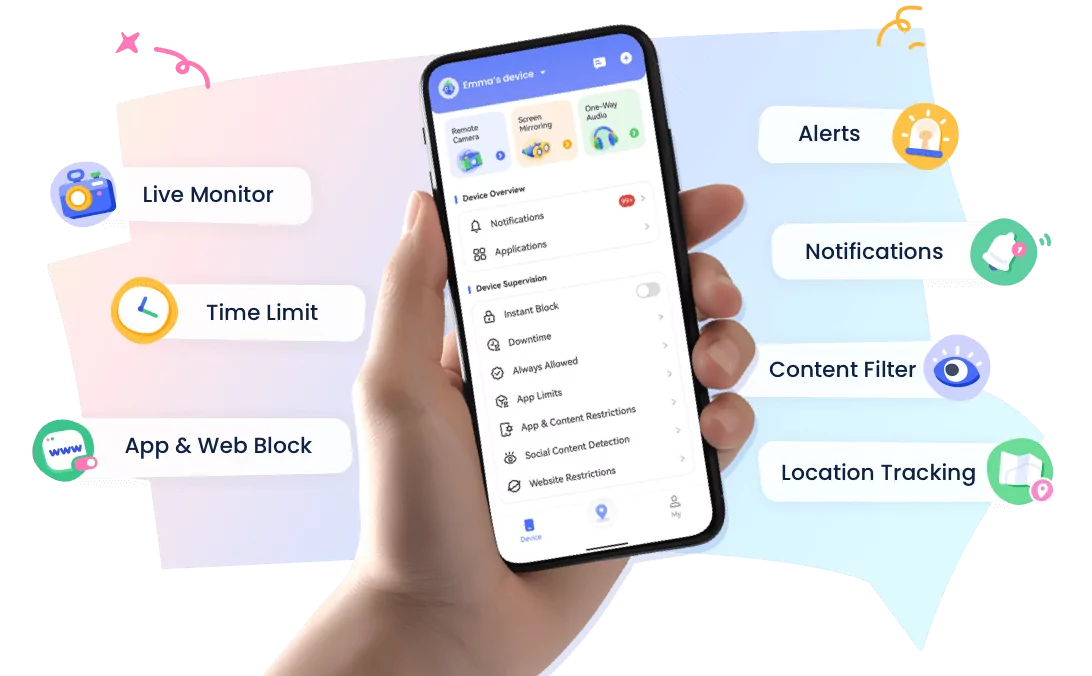Empowering Parents: Help Children Identify and Avoid WhatsApp Scams
Imagine getting a panicked message from your child on WhatsApp. They say they’ve lost their phone and need money right away. Would you know if it’s a scam? Scammers now use clever tricks like fake voices and urgent texts to target families. This guide will show you their tactics and give you simple tools. You can teach your child to spot these dangers and stay safe online.
The Growing Threat of WhatsApp Scams
In 2023, consumers lost $470 million to scams starting with text messages. This is five times more than in 2020. [FTC Data]
In India, WhatsApp saw 43,797 cyber-fraud complaints in early 2024 alone. This was more than any other messaging app.
In the UK, Action Fraud reported over 600 WhatsApp frauds in the first half of 2024. The "Hi Mum/Dad" scam led to losses between £226,744 and £490,606. [The Sun]
"Task" or "job" scams promise easy money for online work. These scams accounted for a staggering $470 million in losses. [FTC Data]
Globally, investment scams on apps like WhatsApp are rising. Cases grew from 12,368 in 2022 to 15,145 in 2023. This resulted in over $320 million in reported losses.
As technology improves, these scams become smarter and more common.
| Metric | 2022 | 2023 | Change |
|---|---|---|---|
| Total WhatsApp fraud complaints in India | — | 43,797 (Q1 2024) | — |
| UK WhatsApp fraud reports (Action Fraud) | — | 600 (H1 2024) | — |
| Messaging-platform investment-scam cases | 12,368 | 15,145 | +22.5% |
| Total lost to investment scams via apps | $276 million | $320.7 million | +16.3% |
Common WhatsApp Scams That Target Children
| Scam Type | How It Works | Real-World Example |
|---|---|---|
| Impersonation (“Hi Mom”) | A scammer pretends to be your child. They claim their phone is lost or broken and ask for money urgently. | “Hi, Mom, this is my new number. My phone fell in water! Please send $200 now or I’ll be stranded!” |
| Phishing Links | A message has a link to a fake website. It’s designed to steal passwords or bank details. | “Your WhatsApp is expiring. Click here to verify your account.” (The link goes to a fake site.) |
| Verification Code Hijacking | A scammer tricks you into sharing your login code. They use it to take over your WhatsApp account. | “Oops, I sent my code to you by mistake. Can you please send it to me?” |
| Voice-Cloning Impersonation | Scammers use AI to copy a child's voice. They send a voice note asking for money for a fake emergency. | A parent gets a real-sounding voice note from "their child." The voice asks for money to solve a problem. |
| Fake Giveaways & Job Offers | These promise free gifts or easy jobs. They trick kids into sharing private info or paying small fees. | “Congrats! You won a $100 gift card. Just pay a $5 processing fee to claim it.” |
| Malware Links | A link downloads harmful software (malware). It can spy on your phone or lock your files. | “Check out these cool photos!” (The link installs software that steals your contacts and messages.) |
Recent Real-World WhatsApp Scams
1AI Voice-Cloning Emergency (Kanpur, India)
In June 2024, scammers used AI to clone a voice in a WhatsApp call. A man named Waseem sent ₹100,000 (~$1,200). He thought it was for his "daughter's heart surgery." [The Times of India]
2Florida Bail-Out Scam (~$30,000)
A Florida family almost lost $30,000. Scammers used an AI-cloned voice of their son. They claimed he was in jail and needed bail money.
3UK "Hi Mum" Scam Evolves with AI Voice
In early 2024, over 500 UK scams used AI voices to pretend to be children. Total losses reached £490,606 ($650,000), with victims losing £970 on average.
4Lucknow Voice-Phishing Scam
A 72-year-old man lost ₹81,747. He received a message with a fake voice. It claimed his friend was in a bad accident and needed money. [The Times of India]
Scam Evolutions: What Parents Need to Know
1AI-Cloned Voice Calls (Voice Deepfakes)
Voice-cloning scams are growing fast. These are realistic but fake audio clips made by AI. A McAfee study found 77% of victims lost money. Scammers only need a short audio clip from social media to copy a voice.
2Gamified “Task Scams” via WhatsApp
These scams offer easy tasks for small payments. Once you're hooked, they ask for larger payments to "unlock" your fake earnings. This trick is becoming very common.
3Deepfake Video Scams
Scammers also use fake videos to build trust. They might pretend to be a celebrity or a new friend. Then, they trick victims into fake investment or job schemes.
Empowering Your Child: Practical Tips
Verify Unknown Numbers
Tell your child to never reply to unknown numbers. If a message seems to be from you, they should call you back on your saved number.
Spot Phishing Links
Teach kids to press and hold a link to see the real web address. A real WhatsApp link will always include "whatsapp.com."
Guard Verification Codes
Explain that WhatsApp never asks for their code. They should never share their six-digit code with anyone, for any reason.
Establish a Family Code Word
Create a secret family password. If someone asks for help, you can ask for the code word to prove it's really them.
Use In-App Reporting
Show your child how to block and report spam. Open the chat → tap the number → scroll down and tap Report → Block.
Enable Two-Step Verification
Turn on WhatsApp’s two-step PIN. This adds another layer of security to their account and helps prevent hijacking.
Encourage Open Communication
Let your child know it's always safe to talk to you. If a message feels strange or urgent, they should show you first. A quick pause can prevent a big mistake.
Are Your Teens on WhatsApp? Try AirDroid Parental Control
Filter inappropriate content on WhatsApp and send instant alerts; sync WhatsApp notifications and schedule WhatsApp usage.

Family Verification Checklist
| Question to Ask | Red Flag? (If "No," it's a risk) |
|---|---|
| Do I know this number? | ✘ |
| Does the message sound calm and normal? | ✘ |
| Can I ignore the request for money or clicks? | ✘ |
| Can I check with them on a different app or call? | ✘ |
| Did they use our family code word? | ✘ |
Building Resilience Against Scams
The data shows that scams are getting smarter. AI voice cloning and fake job tasks are now major threats. They target our trust and our desire to help loved ones. This is why being prepared is so important.
By teaching your child to use tools like call-backs and a family code word, you build a strong defense. A cautious mindset and open communication are the best ways to protect your family from even the most advanced scams.














Leave a Reply.